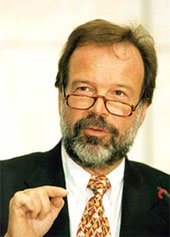Russia's economy to develop steadily during the current decade, German experts say
Pravda.Ru interviewed one of the most respectable analyst in the world, Mr. Norbert Walter, the Chief Economist of Deutsche Bank Group
Norbert Walter, the Chief Economist of Deutsche Bank, enjoys the reputation of one of the most respectable analysts in the world. A recent report from his research group which gave a forecast on the development of the world economy before 2020, contradicted to previous predictions outlined by CIA experts and Goldman Sachs investment group. 
It is worth of note that Walter's group suggested not so long ago that the USA would remain the only superpower in the world in 15 years, whereas the US dollar will keep the firm position of the global currency. According to the forecast, Europe is destined to experience a slow decline, China and India and their dynamic economies will add their style to the group of three world leading states. Unfortunately, the group's report did not unveil the future of Russia. We decided to fill the gap and asked Mr. Walter to briefly outline the perspective of Russia's economic development for the forthcoming 20 years. In addition, Norbert Walter agreed to answer our other questions.
Mr. Walter, what forecast can you give for the development of the Russian economy during the forthcoming 20 years?
Until the end of this decade the Russian economy will continue to post strong growth. From 2010, however, this will start to change and the trend will reverse in 2015: I then see long shadows being cast over Russian growth. Demographic change will weigh more heavily on Russia than on western European nations. Russia's share of the world population will decline from 2.4% (as of 2000) to 1.6% in 2025. One particularly problematic issue for Russia is that by 2025 the number of people aged 15-24 will have contracted by 45%. The economic consequences of this will start to become apparent in just a few years' time. An effective education policy will, however, enable Russia at least partly to mitigate the future lack of skilled persons joining the workforce. Furthermore, political uncertainty could emerge towards the end of President Putin’s second term in office in 2008.
How do you estimate the perspectives of Latin American states?
Golden years may actually lie ahead for the Latin American countries, as the region has worked its way out of economic stagnation. Entrepreneurs in these countries have developed a global focus and have distinguished themselves by operating their companies soundly. Moreover, the countries have large reserves of raw materials, particularly in the agricultural sector, and offer these at competitive prices in the dynamic markets of North America and Asia. So, the global appetite for raw materials is bolstering the position of the Latin Americans. Venezuela's President Chavez and in particular his energy policy do certainly give cause for concern. The other left-wing governments are pursuing sound economic policies for the moment. They should be feeding their citizens less populism and instead espousing the benefits of market-friendly policies. Stability is essential for long-term growth on this continent, but this is what Latin American markets lack. The volatile economy reflects this – and is holding back the upturn.
Goldman Sachs investment group put forward a theory about the imminent economic upsurge in Brazil, Russia, India and China (BRIC). Do you think that it is a correct forecast to make?
All the relevant indicators point to strong growth in the BRIC countries during the next 5 years. After 2010, however, the performance of the individual countries will start to diverge strongly. Russia will then have to take action to counteract its loss of human capital. Investment in India in the education segment, for example, will already bear fruit; Brazil can also call on a large pool of young members of the workforce. Although China has a very large population it needs to concentrate by then on making the transition from a manufacturing sector focus to boosting a skill intense sector including services.
Where do you see the oil prices in 2020?
Crude oil futures indicate a long-term price of over USD 60 per barrel. To date, however, this forecast indicator has not proved to be accurate. I see the oil price falling in the coming years. I expect a barrel of oil to cost USD 60 in 2006, USD 50 in 2007 and USD 45 in 2008. After that, however, the price will start to rise again, I believe. In 2010 the oil price will climb to USD 60. Accurately predicting the oil price in 2020 would no longer be forecasting but clairvoyance. The oil price, of all things, is extremely sensitive to exogenous shocks, as we have only recently experienced following Hurricane Katrina. Even I as chief economist cannot predict how the geopolitical situation will develop, let alone what natural disasters may occur. So let me just make a supposition: between 2010 and 2020 the oil price is likely to fluctuate between 50 and 80 dollars per barrel.
Will Russia gain advantage from possible high oil prices in 2020?
Thanks to its oil and gas reserves Russia will definitely benefit from the anticipated high oil prices. The country boasts an immeasurable wealth of raw materials. It would be well advised to invest some of that in infrastructure. This would ensure that all Russians benefit from their country's mineral wealth. Only this way and with major education initiatives can the country enhance the transition from a commodity-based economy to a post-industrial society. I doubt, however, that this monetary advantage will still deliver strong economic growth in 2020 given Russia's declining labour potential.
How do you envisage Russia's chances against the background of the global competition with world superpowers, with China and India in particular?
Despite the wealth Russia derives from oil, gas and other natural resources I do not expect it to be among the leading economic powers in 2020. Economic growth will be low due to the demographic downturn, as in Japan and Europe as a whole. In the second decade India will already be growing faster than China. In 2020 the USA will still be the biggest economic power, just ahead of China.
You say that the USA will remain the world's only superpower, although it currently faces the danger of immense budgetary shortage and the negative foreign trade balance. In addition, the US depends on the import of strategically important raw materials. Are you certain that the USA will be able to cope with these problems? If so, then how?
Until 2025 I see the USA remaining the world’s leading nation. All the same, the existing current account deficit will impose painful restrictions on citizens and the state between 2007 and 2012. The twin deficits have to be reduced. Although consumption and real estate prices are currently booming in the USA, these trends will reverse. The dollar will weaken against the euro and the yen, and US interest rates will rise. But then US real estate prices will collapse and US consumers will see the value of their already tiny reserves shrink. In a country with a savings ratio of 0.2% this is bound to send consumption nosediving. The result may even be a recession, which could also jeopardise European and Asian exports due to low demand for imports. After 2012 the process of adjusting to the current account deficit should however have been completed. I expect that the position of the USA will then improve again. In 2025, though, the entire western world will have reached a turning point: there will be major geostrategic changes. Asia will assume the ascendancy.
On the photo: Norbert Walter, the Chief Economist of Deutsche Bank
Sergei Malinin
Subscribe to Pravda.Ru Telegram channel, Facebook, RSS!





